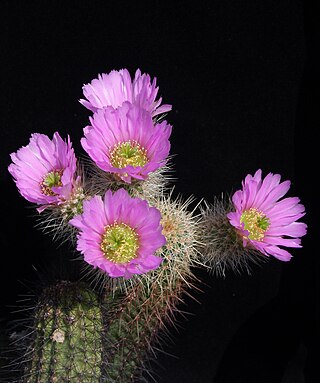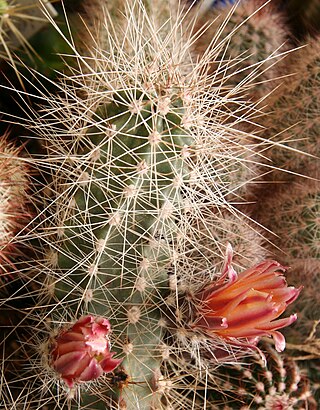
Echinocereus stramineus is a species of cactus, with stramineus meaning made of straw. There are various common names such as strawberry cactus, porcupine hedgehog cactus, straw-color hedgehog, and pitaya. The straw-colored spines distinguishes this particular plant from other Echinocereus. The aged spines may turn white in color and are very fragile.

Echinocereus poselgeri, also known as the dahlia cactus, is a species of Echinocereus. It is native to Coahuila and southern Texas.

Echinocereus pentalophus, with the common name ladyfinger cactus, is a species of Echinocereus cactus, in the tribe Echinocereeae Tribe. It is native to North America.

Echinocereus berlandieri is a species of hedgehog cactus. Its range includes most of South Texas, and is commonly found along the Nueces River and the lower Rio Grande.

Echinocereus scheeri is a species of hedgehog cactus in the family Cactaceae, native to northern Mexico. With its dramatic offsets, it has gained the Royal Horticultural Society's Award of Garden Merit.

Echinocereus enneacanthus is a species of flowering plant first described by George Engelmann.

Echinocereus cinerascens is a species of cactus native from Texas to Mexico.

Echinocereus spinigemmatus is a species of cactus native to Mexico.

Echinocereus acifer is a species of Echinocereus found in Mexico

Echinocereus papillosus is a species of cactus native to Texas and Mexico.

Echinocereus viereckii is a species of cactus native to Mexico.

Echinocereus mapimiensis is a species of cactus native to Mexico.

Echinocereus brandegeei is a species of cactus native to Mexico.

Echinocereus ledingii is a species of cactus native to Arizona.

Echinocereus maritimus is a species of cactus native to Mexico.

Echinocereus nicholii is a species of cactus native to Mexico.

Echinocereus polyacanthus is a species of cactus native to Mexico.

Echinocereus adustus is a species of cactus native to Mexico.

Echinocereus laui is a species of cactus native to Mexico.

Echinocereus pamanesii is a species of cactus native to Mexico.






















